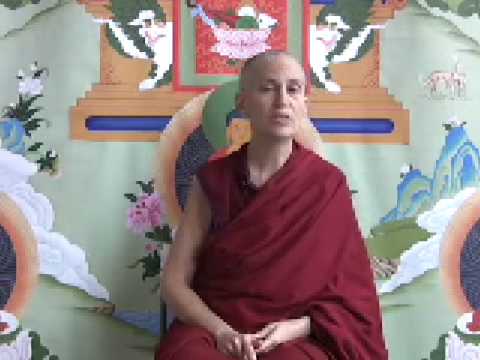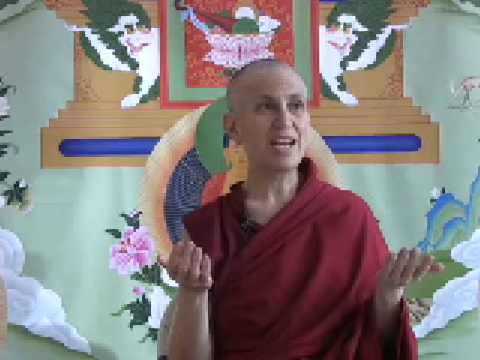Verse 34-5: Afflicted views
Verse 34-5: Afflicted views
Part of a series of talks on the 41 Prayers to Cultivate Bodhicitta from the Avatamsaka Sutra (the Flower Ornament Sutra).
- Pinpointing our own wrong views
- The view of the perishing aggregates
- Eternalism and nihilism
- Bad modes of ethics and conduct
41 Prayers to cultivate bodhicitta: Verse 34-5 (download)
“May all beings be unkind to wrong views.”
This is the prayer of the bodhisattva when seeing someone not repaying kindness.
Usually when we see people not repaying kindness when we think they should, we get angry at them, judgmental, and a little bit disgusted. Actually, what we should do if we’re with friends and they’re doing this kind of thing, is when there’s a suitable time, when the person isn’t in the middle of doing something else and their mind seems kind of relaxed, then to just talk it over with them, say “You received this kindness and I saw you acting in this way. I was just wondering why that was happening.” Some way to make them aware without (demanding): “You should be doing this.” Here, it’s easier to say that when you’re not repaying the kindness of somebody else. We always complain about them not repaying our kindness altogether, so forget that one. Don’t even try to correct somebody on that one, because that’s just our own dissatisfied mind, isn’t it?
The real thing we should not be kind to is wrong views. Instead of judging other people when they’re not repaying kindness, to change our own mind and to think: “I should be unkind to my own wrong views.” We always start out with our own wrong views. Of course, we all think we don’t have any and that shows the depth of our wrong views. Doesn’t it?
In the teachings there are all different sorts of classifications of afflictions. Asanga has one category called “afflicted views.” It’s one of the six root afflictions. Within those afflicted views there are five kinds of them. One of those is wrong views, but actually all of them are wrong views.
The first one is what we call the view of the perishing aggregates. That’s the one called jigta in Tibetan and that’s grasping at one’s own “I” or “mine” as truly existent.
The second one is views of eternalism and nihilism, and that is based on first the grasping at the true existence of oneself and then thinking in eternalism’s view that at the time of death the self continues as some kind of inherently existent soul, or self, or me that continues on. Or if we have a nihilistic view, thinking that that solid inherently existent self completely ceases at the time of death. We very easily fall to these two. You can see it so often when people are talking about reincarnations of their teachers, they are thinking, “There is this inherently existent being that’s still the same person in the next life.” No. There’s continuity but it’s not the same person. Having that view free of the two extremes of eternalism and nihilism is not that easy because that really means understanding emptiness properly. Of course there are various ways of describing eternalism and nihilism too. There are all sorts of different degrees and different layers, but leave that aside.
The third wrong view is thinking that bad modes of ethics and conduct are the path to liberation. Bad ethics, wrong teachings. Doing certain actions thinking they are path to liberation, and they’re not the path. It could be holding wrong ethics, like animal sacrifice is fine and things like that. Holding what is not the path to be the path would be like in ancient India you had people who believed that if you jump on a trident and it comes out the top of your head it means you’re enlightened. If you crawl around like a dog it means you’re using up your dog karma and you will be reborn as a human being.
They always give those examples of wrong ethics and wrong path, but in our situation we have to look again, because there are all sorts of wrong ethics abounding in our society, that people think are okay, that we think are okay. There are all sorts of things that aren’t the path that we think are the path. Different superstitious practices.
The one is often explained in the Theravada tradition is thinking that just doing certain observances and certain ceremonies and rituals properly, in and of themselves, is the path. This one was quite popular at the time of the Buddha. If you hire a Brahmin and they do the ceremony and it is done perfectly, then you get the right result. We get into these same kinds of things with our stuff too. “I don’t really have to understand this practice as long as I’m just mumbling it in whatever language, I get the same good karma from it.” There are lots of these kinds of things. Adhering to different superstitious things. That kind of stuff.
Think a little bit about the path and the wrong ethical conduct. Make some examples.
Venerable Thubten Chodron
Venerable Chodron emphasizes the practical application of Buddha’s teachings in our daily lives and is especially skilled at explaining them in ways easily understood and practiced by Westerners. She is well known for her warm, humorous, and lucid teachings. She was ordained as a Buddhist nun in 1977 by Kyabje Ling Rinpoche in Dharamsala, India, and in 1986 she received bhikshuni (full) ordination in Taiwan. Read her full bio.


